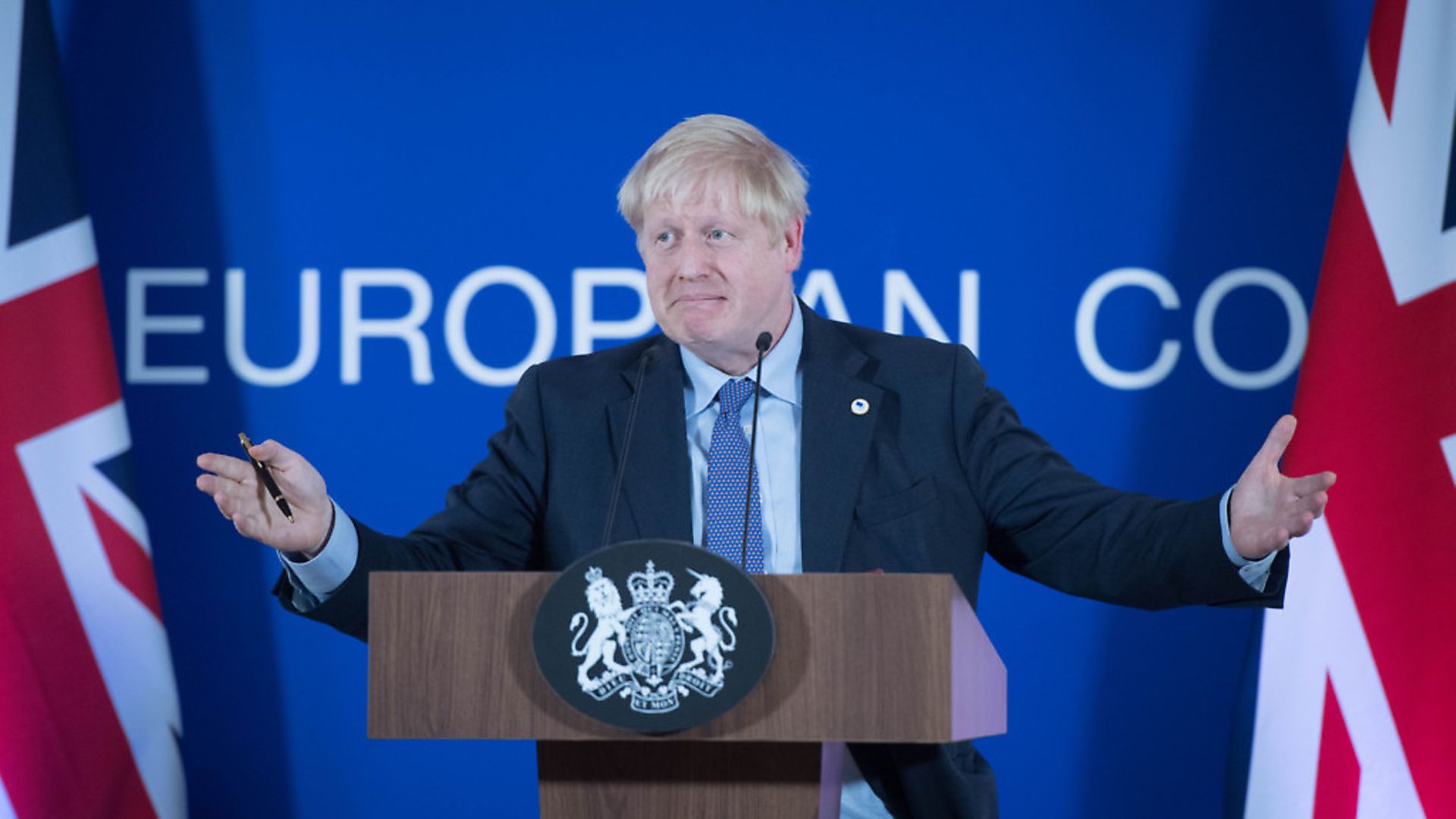
As the party of Forever Brexit, the Conservatives will struggle to persuade voters they can simply get the job done and move on, says ZOE WILLIAMS.
This isn’t a surprising election. It was inevitable from the minute Boris Johnson said it wasn’t his intention. He is far from the stopped clock that’s right twice a day: He is reliable all the time, so long as you take him for the opposite of what he says. It isn’t even a shocking one, despite its bizarre timing, circumstances and context, two parties slugging it out at their nadir. Compared to a regular poll, it’s the difference between diving into the sea in June and falling into the sea in December: Arresting, exhilarating even, but not necessarily in a pleasant way.
The Conservatives are walking in to this with a great deal of swagger. It’s possible that they are beset by doubts and keeping a monumentally impressive and coordinated poker face. But given their overall level of competence, this seems unlikely. Their assurance is based on polls and truisms; it is a fact that Labour’s leader trails the Tories’ to a gob-smacking degree; it is true that, in polling terms, the Liberal Democrats pose a greater threat to Labour than the Brexit Party does to the Conservatives.
Demonstrably, Labour look as or more divided than the Conservatives, 11 of their MPs voting against the party line, just as Johnson readmitted 10 of his 21 expulsions. It is true that there is no precedent for an opposition to be performing so badly against a government which is itself so unpopular, but the confidence they take from that is gating off any mature reflection on their own lack of popularity.
Conservative confidence appears immune to the substantial losses which they must have already priced in: Most if not all of their Scottish seats, many if not all of the metropolitan elite hotbeds whose residents they have castigated as arrogant and irrelevant for so long. Plainly, they think they can offset this and more by taking the Labour heartlands, whose Leave tendencies they crow about as votes in the bag.
They forget how much of this picture is their own mythologising, how this vast constituency of the angry white working class was actually manufactured rhetorically to make a point on Question Time. They are right to be confident of their Surrey pensioner vote, which appears to get more trenchant, the more outrageous the question. Yet their idealised working class, always northern, always white, always instinctively anti-immigration, and crucially, homogenous in view, doesn’t exist.
Conservatives have had to portray the honest working folk as unanimous on Brexit in order to create the picture of a dichotomy between them and the inauthentic metropolitan elites; but that’s all it ever was, a prescriptive image to subdue opponents, not a descriptive one of a real-life electorate. The Labour vote in those heartland areas was always mainly Remain, even where the constituency overall voted Leave.
Other issues – austerity, the NHS, public services – have much higher saliency, which is how they came to be Labour heartlands in the first place. The Tories are trying to marshal the forces of the raging left-behind, while only speaking to the affluent. It was interesting that, as soon as the election was announced, mirror emails went round from Jeremy Corbyn and Boris Johnson to their members, with a stack of clicks through to donate to their respective campaigns.
The Labour leader asked for £1, £3 or £8; the Conservatives, £20, £50, £100 or £250 (the £100 was highlighted: You have to admire their brass neck). They no longer conceive of any allegiance from people to whom 20 quid is quite a lot of money: and this will be a problem, not come the dark night of their souls (though that too), but when it comes to making believable statements about how they plan to ameliorate the lives of the wider voting public.
Promises of a generous Conservatism, fist-shaking about the “mess left by Labour”, worked surprisingly well in the early part of this decade, but cannot conceivably exculpate a party that has been in government for almost ten years. It is amazing how easily the political class is persuaded by declarations of largesse: The lessons of the 2017 election were that the only voters who swallow big talk of loosened purse strings from Conservative manifestos are the ones whose wellbeing isn’t riding on it.
To believe the polls as they stand today, Labour lagging by double-digits, the Conservatives must surely have made their own internal account of them: Which, no doubt, would be that Remainers are so disappointed in Corbyn that Labour’s youthquake and their urban bounce of last time around have already evaporated. This is a huge “if”, because where else would those Remainers go? Sure, they can vote for the Lib Dems; but, by definition, these aren’t dyed-in-the-wool Swinsonites. If they were previously Labour and their main drive is to stop Brexit, they will vote tactically rather than hauling their loyalty, wholesale, over to another, quite different party.
Every party believes that the winner will be whoever makes the most convincing case that they can make Brexit go away: In this they are probably correct. It is the only thing left that both Leavers and Remainers agree on – upwards of 70% of each telling YouGov they had Brexit fatigue. But again, Johnson has swallowed his own propaganda, and chosen to believe, simultaneously, that ordinary people are bored of parliament, yet watching it closely enough to sift it for minute-by-minute decisions.
Whoever ought to have voted for what, in whomsoever’s imagination of what an ideal relationship with the EU would look like, the entire project is unmistakably a Conservative one. All passion for it resides there. They have made it their own so forcefully, made it the carrier issue for so many of their other obsessions – deregulation, free-market fundamentalism, craven US-ophilia – mediated their internal power struggles through it so single-mindedly, that their “get on with it” mantra can’t mask what they have become, the party of Forever Brexit.
Johnson’s government, powered (in his own words) by optimism and (in everyone else’s) by a conscious uncoupling from reality, may also be relying on the turn-out issue, Labour being classically hit hardest by inclement weather. In fact, this is one of those old saws repeatedly disproven, but the research never seems to stick: There is no statistically significant correlation between weather and turnout. We haven’t had a winter election since the two cold(ish) votes of February and October 1974: whatever you could learn from such distant precedents – and it isn’t much – Labour won both of them.
Nobody can be gung-ho about an election in these circumstances; nobody is riding high, nobody is united, nobody is perceptibly well-organised. Yet I’m looking forward to it nonetheless, because ultimately, an election has the elegance, the unforced truthfulness of a joke: You can focus-group what’s funny, you can poll people on it, you can assert that it’s funny, you can get your friends to laugh with you, you can get the Queen to tell parliament that it’s funny, you can say that everyone who doesn’t think it’s funny is just the wrong sort of person. But come December, Boris Johnson will have to stop telling us what’s funny, come out and make us laugh. And I don’t think he can.










